Letting the grain take the strain
Updated: 2012-03-05 09:07
By Zhou Siyu (China Daily)
|
||||||||
One man's medicine
Agricultural stocks and futures were boosted by the message contained in the document. The day after it was issued, nearly all agricultural futures rose on China's major exchanges. Shares in agricultural companies also rose, despite a decline in the market overall.
"The document is good news for the entire industry," said Jin Yi, deputy general manager of Winall Hi-tech Seed Co Ltd, the country's third-largest producer of rice seeds. Based in Hefei, the capital city of eastern China's Anhui province, Jin's company exports rice seeds to a large number of countries, including Bangladesh, Vietnam, Pakistan and Indonesia.
Companies said the document also helped to strengthen their connections with government-funded research institutes. These institutes had previously remained largely isolated from the market. According to the document, the government will encourage research institutes to cooperate with companies and set up a "commercial research mechanism" centered on the needs of the companies.
In the past, small companies with limited resources found it difficult to achieve cooperation with research institutes. That led to many companies simply abandoning research and turning to the production of fake and counterfeit seeds, or whatever turned a profit, said Jin. "Now the institutes will offer themselves up for cooperation with companies," he said.
In the meantime, the companies also expect the document to bring order to the market. Industry data indicates that around 30 percent of China's smaller seed companies are involved in the production and sale of counterfeit seeds every year. In line with measures previously released by the Ministry of Agriculture, the document also stressed the government's determination to fight the production of counterfeit seeds.
"The market conditions are improving," said Lance Wang, general manager of CNSGC-Dekalb Seed Co Ltd, a JV between the US-based crop-biotechnology company Monsanto Co, and Sinochem Co, a Chinese agrichemicals conglomerate.
Wang said the document was the "right prescription" for the country's "ailing seed industry". But he also warned that the current improvement in market conditions might just be low-hanging fruit. What is really needed, said Wang, is a stable and consistent mechanism that will improve the industry and strengthen the protection of intellectual property rights.
Wang's company specializes in corn seeds. In September, it invested 450 million yuan in its first seed-processing factory in Northwest China's Gansu province. When completed, the facility will have an annual processing capacity of 35,000 tons, according to the company.
Wang said he believed that there is still potential in China's huge corn-seed market, given that in recent years the country's corn production per hectare was little more than half of that of the US. "China's market is highly segmented," he said.
However, that may change, too. Analysts believe that, prompted by the document, industry rationalization is just around the corner. China now has more than 120 large seed companies with the ability to undertake research into seed breeding. Only 20 to 30 of them could survive a reshuffle, according to industry reports.
"The market will consolidate into a handful of major domestic players. And they will be big," Wang opined. He also reckoned that China's seed industry might follow the pattern of the US in the years to come. "Big companies conduct research and develop new varieties, while small companies, at the lower level of the industrial chain, build distribution channels," Wang said.
As a result, "Chinese companies will become more competitive", he added.

 Relief reaches isolated village
Relief reaches isolated village
 Rainfall poses new threats to quake-hit region
Rainfall poses new threats to quake-hit region
 Funerals begin for Boston bombing victims
Funerals begin for Boston bombing victims
 Quake takeaway from China's Air Force
Quake takeaway from China's Air Force
 Obama celebrates young inventors at science fair
Obama celebrates young inventors at science fair
 Earth Day marked around the world
Earth Day marked around the world
 Volunteer team helping students find sense of normalcy
Volunteer team helping students find sense of normalcy
 Ethnic groups quick to join rescue efforts
Ethnic groups quick to join rescue efforts
Most Viewed
Editor's Picks

|

|

|

|

|

|
Today's Top News
Health new priority for quake zone
Xi meets US top military officer
Japan's boats driven out of Diaoyu
China mulls online shopping legislation
Bird flu death toll rises to 22
Putin appoints new ambassador to China
Japanese ships blocked from Diaoyu Islands
Inspired by Guan, more Chinese pick up golf
US Weekly

|

|







